|
|
|
Sort Order |
|
|
|
Items / Page
|
|
|
|
|
|
|
| Srl | Item |
| 1 |
ID:
151647
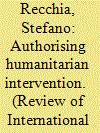

|
|
|
|
|
| Summary/Abstract |
Even scholars who support multilateralism in principle frequently question the value of securing approval from existing multilateral bodies for humanitarian intervention. The United Nations (UN) and regional organisations such as NATO, the argument goes, are far from democratic; furthermore, multilateralism is often a recipe for doing nothing; therefore, unauthorised intervention should be permissible in circumstances of ‘humanitarian necessity’. This article maintains that although today’s multilateral organisations and related procedures for authorising armed intervention may be suboptimal, they have significant output legitimacy. First, existing authorisation procedures reduce the risk of destabilising conflict spirals among powerful states. Second, they diminish the likelihood that humanitarianism will be used as a pretext. Third, they reduce epistemic problems concerning the identification of a just cause for intervention and thus the risk of accidental abuse. Fourth, they minimise the ‘moral hazard’ of humanitarian intervention. Finally, compliance with multilateral procedures is increasingly required for successful peacebuilding. This leads me to conclude that humanitarian warfare should always be authorised by the UN or regional multilateral organisations.
|
|
|
|
|
|
|
|
|
|
|
|
|
|
|
|
| 2 |
ID:
151648


|
|
|
|
|
| Summary/Abstract |
How do members of the general public come to regard some uses of violence as legitimate and others as illegitimate? And how do they learn to use widely recognised normative principles in doing so such as those encapsulated in the laws of war and debated by just war theorists? This article argues that popular cinema is likely to be a major source of influence especially through a subgenre that I call ‘Just War Cinema’. Since the 1950s, many films have addressed the moral drama at the centre of contemporary Just War Theory through the figure of the enemy in the Second World War, offering often explicit and sophisticated treatments of the relationship between the jus ad bellum and the jus in bello that anticipate or echo the arguments of philosophers. But whereas Cold War-era films may have supported Just War Theory’s ambitions to shape public understanding, a strongly revisionary tendency in Just War Cinema since the late 1990s is just as likely to thwart them. The potential of Just War Cinema to vitiate efforts to shape wider attitudes is a matter that both moral philosophers and those concerned with disseminating the law of war ought to pay close attention to.
|
|
|
|
|
|
|
|
|
|
|
|
|
|
|
|
| 3 |
ID:
151646
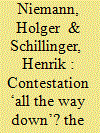

|
|
|
|
|
| Summary/Abstract |
The meaning of norms is empirically contested. Supposing an inherent instability of norm meaning, contestation, therefore, represents a fundamental conceptual challenge to the mainstream view on norms as shared understandings. By offering a grammatical reading of Antje Wiener’s approach to contestation, we examine how norm research addresses this challenge to its theoretical core assumption. We argue that the grammar of Wiener’s approach, despite its reflexive starting point, ultimately reintroduces an understanding of norms as facts and leads to a normative ‘politics of reality’. This effectively turns contestation into a disruption of the ‘normal’ state of norms. Demonstrating the challenges of theorising norms with rather than against contestation, the article concludes that norm research has yet to find ways to account for contestation ‘all the way down’ in order to sustain norms as a productive analytical concept in IR.
|
|
|
|
|
|
|
|
|
|
|
|
|
|
|
|
| 4 |
ID:
151650


|
|
|
|
|
| Summary/Abstract |
The extrajudicial killing of Osama bin Laden (OBL) on 2 May 2011 was greeted with jubilation in the United States. The dominant interpretation of the event – expressed in US media, by US political elites, and on the streets of US cities – was that justice had been served on the perpetrator of the 9/11 atrocity and thereby a great historical wrong had been righted. This article argues that the ‘justice’ deployed was a proxy for revenge, understood as the infliction of harm on those who had inflicted harm on the avenger. The argument is situated in a broader discussion of the emotional topography on which acts of state revenge are politically premised. The bin Laden case is used to explore some issues raised by the growing literature on emotions in politics and International Relations including, most importantly, how emotions are collectivised and made public.
|
|
|
|
|
|
|
|
|
|
|
|
|
|
|
|
| 5 |
ID:
151653


|
|
|
|
|
| Summary/Abstract |
This article asks when, how, and why states started to use the concept of international community in the shared language of diplomacy and international law. It argues that the concept was accepted to the interstate language as a result of debates over international institutions, which were to acquire a universal character, at the Hague Conferences of 1899 and 1907. The article suggests that conceptual changes in interstate language should be understood as products of rhetorical power struggles, in which some arguments lose the battle while others prevail, some concepts are discarded while others modified. The article suggests a model of conceptual change that explains an innovation in interstate language. First, it draws attention to collective assertive speech acts at diplomatic events that signal changes in international politics. Second, it examines whether such acts implicate conceptual innovations. Third, it posits that the composition of epistemic community assembled at the Hague determines the nature of conceptual innovation. Fourth, it demonstrates how rhetorical interventions into debates at the conference introduce and mould relevant concepts. Fifth, it illuminates how contextualisation of the conference interventions in professional debates helps us understand the polemical nature of arguments and the scope of conceptual innovation.
|
|
|
|
|
|
|
|
|
|
|
|
|
|
|
|
| 6 |
ID:
151652
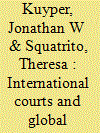

|
|
|
|
|
| Summary/Abstract |
In a post-Cold War era characterised by globalisation and deep interdependence, the actions of national governments increasingly have an effect beyond their own territorial borders. Moreover, key agents of global governance – international organisations and their bureaucracies, non-state actors and private agents – exercise pervasive forms of authority. Due to these shifts, it is widely noted that world politics suffers from a democratic deficit. This article contributes to work on global democracy by looking at the role of international courts. Building upon an original dataset covering the 24 international courts in existence since the end of the Second World War, we argue that international courts are able to advance democratic values and shape democratic practices beyond the state. They can do so by fostering equal participation, accountability, and public justification that link individuals directly with sites of transnational authority. We contend that the ability of international courts to promote these values is conditioned by institutional design choices concerning access rules, review powers, and provisions regarding judicial reason-giving. We canvass these design features of different international courts and assess the promises and pitfalls for global democratisation. We conclude by linking our analysis of international courts and global democratisation with debates about the legitimation and politicisation of global governance at large.
|
|
|
|
|
|
|
|
|
|
|
|
|
|
|
|
| 7 |
ID:
151651
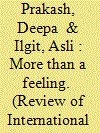

|
|
|
|
|
| Summary/Abstract |
Extant studies suggest that criticism of state practices may create ontological crises in states, thus prompting emotional responses. This article examines what happens when target states reject external criticism, and the failure of outside attempts to shame and criticise. We show that recipients can view international criticism as opportunities to consolidate state identity rather than ontological crises. Using Turkey’s foreign policy towards Israel, we focus on the agency of weak states by expanding the range of emotions stemming from non-acceptance of criticism and by emphasising the role of leaders when crafting emotional responses to negative representations.
|
|
|
|
|
|
|
|
|
|
|
|
|
|
|
|
| 8 |
ID:
151645
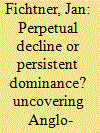

|
|
|
|
|
| Summary/Abstract |
The prediction of America’s decline is a regularly recurring phenomenon; this also pertains to the pivotal field of global finance. This article argues that, first we have to consider the United States together with the other Anglophone countries. The English-speaking countries and territories – Anglo-America – have deep common political and socioeconomic roots, of which the unique global Five Eyes intelligence cooperation is merely one manifestation. In finance, New York and London (NY-LON) constitute the decision-making core of this transnational formation. Second, to analyse the highly complex phenomenon of structural power in the globalised international political economy we have to dig deeper to uncover truly meaningful data. Thus, this article evaluates data for nine central segments of global finance from around the year 2000 to 2014. Contrary to the assertions of many declinists, these data show that Anglo-America’s dominant structural power has been persistent during this period. Moreover, four novel visualisations show that the US-UK axis is the fulcrum of the international financial system. However, contemporary global finance is characterised by a high degree of latent fragility; significant imbalances, inequalities and contradictions persist and are even likely to grow, potentially undermining the legitimacy and the stability of the whole system.
|
|
|
|
|
|
|
|
|
|
|
|
|
|
|
|
| 9 |
ID:
151649


|
|
|
|
|
| Summary/Abstract |
War experiences are a material of political currency, invoked, appropriated, and ‘written’ in particular configurations to sustain, complicate, and contest narratives about war. This occurs through and within the same relations of power that are intrinsic to the conduct of war as war-experiencing subjects comprise a political vocabulary of selves and others that populate and operate within war’s wider social (re)production. To track these power relations and consider implications for how dominant accounts of war can be complicated and contested, the article is grounded in an analysis of the visual regimes at work in footage, photographs, and testimony relating to the shooting of a group of people by an American Apache helicopter in Baghdad, Iraq in 2007. The event was publicised on a dedicated website and dubbed ‘Collateral Murder’ by WikiLeaks in 2010. Analysis of the website reveals how visual modes and the experiences of war subjects accompany each other, revealing war in contrasting locations of sight and violence: the ‘view from above’, the ‘view from below’, and the view of the ‘on-the-ground’ soldier eyewitness. Taken together these discursively produce ‘Collateral Murder’ and contest the dominance of war known through the experience of those who wage it ‘from above’.
|
|
|
|
|
|
|
|
|
|
|
|
|
|
|
|
|
|
|
|
|